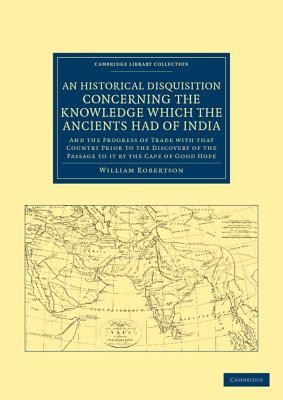
- We will send in 10–14 business days.
- Author: William Robertson
- Publisher: Cambridge University Press
- ISBN-10: 1108046568
- ISBN-13: 9781108046565
- Format: 21 x 29.7 x 2.1 cm, minkšti viršeliai
- Language: English
- SAVE -10% with code: EXTRA
An Historical Disquisition Concerning the Knowledge Which the Ancients Had of India (e-book) (used book) | bookbook.eu
Reviews
Description
William Robertson (1721-93), Principal of the University of Edinburgh and historiographer to His Majesty for Scotland, published this work in 1791. Already famous for a History of Scotland, which went into many editions, and a History of America, Robertson aimed to synthesise all earlier western accounts of the subcontinent from classical times to the sixteenth century. Beginning with a consideration of the practical difficulties facing explorers from Europe and Africa who headed east, Robertson discusses the (legendary) Pharaoh Sesostris of Egypt, Alexander the Great, and Roman military incursions into, and trade with, India, before turning to the Portuguese, Spanish, French and English explorers of the early modern period, furnishing his account with copious source notes. A long appendix then describes 'the genius, the manners, and institutions of the people of India, as far as they can be traced from the earliest ages to which our knowledge of them extends'.
EXTRA 10 % discount with code: EXTRA
The promotion ends in 21d.23:31:57
The discount code is valid when purchasing from 10 €. Discounts do not stack.
- Author: William Robertson
- Publisher: Cambridge University Press
- ISBN-10: 1108046568
- ISBN-13: 9781108046565
- Format: 21 x 29.7 x 2.1 cm, minkšti viršeliai
- Language: English English
William Robertson (1721-93), Principal of the University of Edinburgh and historiographer to His Majesty for Scotland, published this work in 1791. Already famous for a History of Scotland, which went into many editions, and a History of America, Robertson aimed to synthesise all earlier western accounts of the subcontinent from classical times to the sixteenth century. Beginning with a consideration of the practical difficulties facing explorers from Europe and Africa who headed east, Robertson discusses the (legendary) Pharaoh Sesostris of Egypt, Alexander the Great, and Roman military incursions into, and trade with, India, before turning to the Portuguese, Spanish, French and English explorers of the early modern period, furnishing his account with copious source notes. A long appendix then describes 'the genius, the manners, and institutions of the people of India, as far as they can be traced from the earliest ages to which our knowledge of them extends'.


Reviews